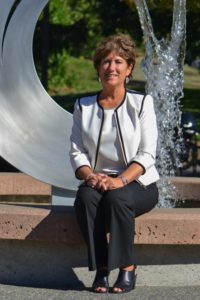As Camosun students finish up their winter semesters, write exams, and get into the swing of remote learning, the college is planning for its summer and fall terms. Summer courses are being offered online, and for the fall semester, Camosun president Sherri Bell says it’s likely Camosun won’t be running a campus with large groups of people congregating. All of this could change if current physical distancing protocols change.
“If we plan for, like we have done for the summer semester, to do most things online, and then if the restrictions loosen a little bit, just following what the provincial health officer says, and perhaps allowing a small segment of the student population on campus if they’re in more high-touch programs or if they have to do labs,” says Bell about the fall.

Bell says that, as provincial health officer Bonnie Henry said on Friday, April 17, questions can be asked about which sections of society can open back up, and what that will look like, but one thing that won’t change when that happens is the physical distancing part of the equation. Bell says the question of what this all means for Camosun as an institution, and for students, is a “huge concern for all of us.”
“We’re continuing to make plans and have different kinds of scenarios in the works so that when we start looking at the fall, which we’re doing now, what could it look like if we had some programs with small groups and others that are completely online? Everything that we’re hearing is that you won’t be running a campus with large groups of people congregating,” she says.
Bell says that while it’s still a bit early, summer enrolment numbers are approximately 85 percent what they were for the summer semester last year. Enrolment rates for international students are down slightly, but that could change, as many international students stayed in Victoria rather than returning home, and the semester hasn’t started yet. Last year there were 600 international students registered for the summer semester; this year there are around 500 so far.
“We know there’s going to be a financial impact,” says Bell. ”What that will be, we’ll find out in the coming months.”
Bell says a lot of students have applied for emergency bursaries—she says that, as of April 17, $96,000 had been given out to 374 students. One thousand students have applied and the applications are being processed as fast as possible, she says. The Camosun College Foundation has given $200,000 into the college’s Erasing Barriers to Education fund, open to any Camosun student facing financial struggle.
“We’ll just keep giving,” she says. “It’s a small amount of money, but it’s at least something to help students go grocery shopping.”
The Ministry of Advanced Education, Skills and Training has given every post-secondary institution in BC an extra $140,000, which is just for students from BC, says Bell (Erasing Barriers funds are for international and domestic students). Bell says the college has also ordered more laptops for students to borrow for free, and that the college is thinking ahead for situations such as, for example, how the trades will be affected.
“What the trades faculty have been doing, each cohort, they’ve been communicating with them individually; you can’t even generalize trades, because each trade is different,” says Bell.
Some aspects of trades can be taught online, she says, but the high-touch trades can’t. For the summer, most of the trades training will be done online.
“I think we just have to be ready, and flexible, and really cognizant,” she says.
Bell says that part of what students come to Camosun for is connection with other students and instructors, and although that’s possible to do online, it’s not easy for all students.
“It hurts when I hear stories of how difficult it is for students and employees,” she says.
Camosun is also making as much personal protective equipment as it can to assist those working in the fight against COVID-19, and Bell says they will continue to do so. The college’s first shipment of face shields went out to Island Health on Monday, April 6. Bell stuck small notes in each box thanking the frontline workers who will use them.
“Whoever opens them sees a note from Camosun and just how much we care about what they’re doing,” says Bell.
Correction: The story originally said the Erasing Barriers to Education Fund had given $200,000 toward bursaries; in fact, the Camosun College Foundation gave $200,000 toward the Erasing Barriers to Education fund. We apologize for the mistake.
